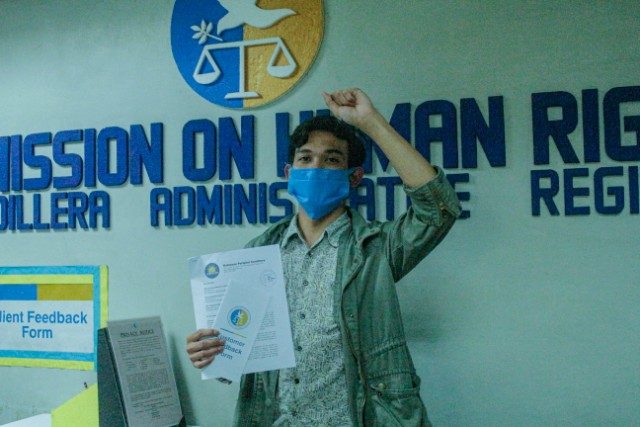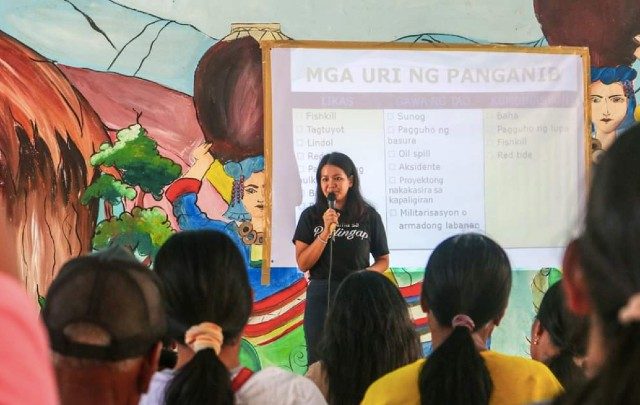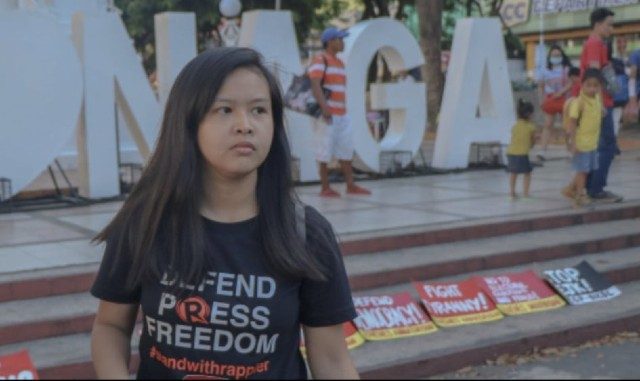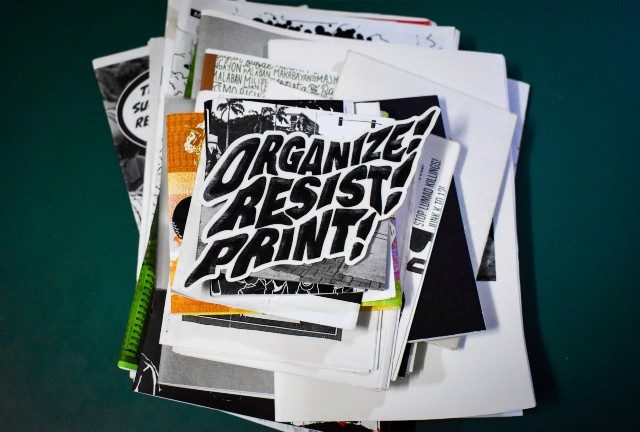SUMMARY
This is AI generated summarization, which may have errors. For context, always refer to the full article.

MANILA, Philippines – Like a thief in the night, in the middle of a raging pandemic, the anti-terror bill hurdled Congress.
The railroading of the draconian legislation was, for many, the ultimate tell-tale of President Rodrigo Duterte’s crackdown on dissent in the Philippines.
Once signed into law, the anti-terror bill is feared to infringe on rights of Filipinos, resulting in a situation much worse than what it is now. Its broad definitions have been branded as lethal, among many provisions that are feared to pave the way for abuse, all while limiting accountability for the state.
The anti-terror bill’s effects will not only be felt in the remaining years of the Duterte presidency, but may also spill over to future administrations. The existence of such law will undeniably impact freedom of speech and expression for generations to come.
At the forefront of the fight against the anti-terror bill are the Filipino youth, the ones who will bear the brunt of its long-lasting effects. They are already the generation coming of age in the face of violence, oppression, and deterioration of democratic institutions in the country.
Rappler spoke with 6 young people about their fears and hopes for the future given the anti-terror bill, and why they continue fighting against oppressive government policies.
‘Sinong hindi matatakot, pero sinong hindi magagalit?’
Christian Ruz has been an activist since 2012, starting as member of student organizations at the University of the Philippines Baguio. His family, initially fearful, came to realize the value of their son’s activism.
“Malaking appreciation ko sa activism kung paano ipinaunawa na may malaking magagawa ang kabataan sa labas ng paaralan,” he said. (I have a huge appreciation for activisim because it made me realize that there’s a lot bigger things for the youth to do outside the school.)
Eight years since, Christian’s commitment has not faltered. When latest developments on the anti-terror bill hit the news, he was deep in relief efforts amid the pandemic with Kabataan Partylist.
Christian said the passage of the anti-terror bill came as no surprise. His organization, where he serves as regional coordinator, is already branded as a communist front.
Christian admits he’s afraid, not just for himself but especially for the communities he is working with. The anti-terror bill excludes no one, after all. It is important to transform that fear into something that will improve the situation, he said.
“Sinong hindi matatakot, pero sino’ng hindi magagalit?” Christian said. (Who won’t be afraid, but who won’t be angry?)
“We are trying to cope with this fear by translating it into rage.”
The dangers that the bill poses for their future should lead to a “recommitment” of the Filipino youth to securing freedom for the country.
“We’re taking all these attacks against the youth as a challenge of this generation,” he said. “Every day is a recommitment on how you live up to the banner of serving the people.”
‘We want to be able to say in the future that we did our best’

Patis Mungcal was surprised when the National Council of Churches in the Philippines (NCCP) was tagged as a communist front by the government.
The 24-year-old looked back at all the times her team did partnerships and had projects with the Department of Social Welfare and Development and local government units. As a training officer, Patis regularly visited communities for disaster risk reduction and management projects.
At first, Patis felt betrayed and scared. But the feelings of wariness were drowned by the massive support the NCCP received from communities.
“Alam nilang ang totoong intentions namin ay tumulong lamang,” she said. (They know that our real intentions are really want to help.)
The Philippines is already under a de facto martial law, she said, so the anti-terror bill came as no surprise. The proposed legislation will just legitimize everything, Patis said.
This is what the Duterte administration wants to happen – to bring forth a climate of fear where people will think twice before helping others or even voicing out their opinion.
But with such dire situation, Patis believes this will breed stronger resistance among the Filipino youth.
“Lumalaki kami sa ganitong social conditions at nakikita naming itong mga problema sa Pilipinas nangyayari before our very eyes,” she said. “We are getting braver and working together to change this reality kasi habang palala ang conditions, lumalakas ang involvement ng youth.”
(We are growing up witnessing these social conditions and problems in the Philippines. We are getting braver and working together to change this reality since while conditions are getting worse, the involvement of the youth is getting stronger.)
It might take years, or even decades, to eradicate the damage inflicted on the public and institutions by the Duterte administration. But according to Patis, she doesn’t want herself and her generation to feel like they didn’t do their best.
“In the future, I hope that when we will look back and we ask ourselves what did we do when all these problems were happening, I hope the answer will not be one of regret, that we didn’t do enough,” she said.
“We want to be able to say we did what we could and we weren’t just passive while history was unfolding before us,” Patis added.
‘Okay lang matakot, pero huwag sumuko’

Abby Bilan, a 20-year-old campus journalist, spent the past few days messaging with family and friends about the anti-terror bill and its dangers to her and her work at ThePILLARS Publication of the Ateneo de Naga University.
There were people who told her to be more careful now, maybe take her press freedom advocacy a notch lower. While the concerns are legitimate, Abby said cowering in fear will do more harm than good.
“Okay lang matakot but huwag ka sumuko kasi nandiyan naman iyong paninindigan mo para sa mga tao,” she said. “Dapat palagi mong piliin iyong side na para sa mga mamamayan basta tama at may katotohanan.” (It’s all right to be afraid but not surrender to the fear because the commitment to the people is there. One should always choose the side of the people, so long as it is right and truthful.)
Journalism is what Abby always wanted to pursue. She remembers the adrenaline rush caused by competitions during her early years as a campus journalist. But she later realized that there is more to journalism than participating in contests.
Her role as a campus journalist in these crucial moments, which many consider the darkest times since Martial Law, cannot be more emphasized. In the bigger scheme of things, her work as a journalist contributes to a stronger democracy.
Abby admits worrying about other people from her generation. They might not be directly involved in journalism or advocacy work, but will surely be affected by the anti-terror bill.
“Napakadelikado na when it comes to deciding for laws like this, ang maapektuhan talaga is mostly iyong generation namin kung saan kami iyong malapit na tumanda at magkaroon ng bigger role sa society,” she said. (It’s so dangerous because with laws like this, those who will be directly affected is my generation since we’re coming of age soon and will play a bigger role in society.)
“Nakakainis kasi (It’s annoying because) the people who are proponents of the bill are people from the older generation but the effects of their laws will be on us, the youth,” Abby added.
‘Paano ang mga komunidad?’

Kyle Salgado’s advocacy work already brought him to farming communities and picket lines. The 20-year-old, now a regional coordinator and spokesperson for Karapatan, is no stranger to the wrath of the military and police.
Karapatan, a human rights group, has been tagged as a communist front by the Duterte administration. The anti-terror bill, once signed into law, will undeniably put their lives in more danger. But Kyle fears mostly for communities already subjected to abuse by the state.
“Nakakatakot iyong maaaring gawin ng gobyerno na pagmanipulate at paglason sa mga mamamayan, paano ang mga komunidad?” he said. (It’s scary how the government will manipulate and poison the minds of people, and what about communities?)
He recalls one incident in May 2020 when a huge number of law enforcers raided a barrio in Batangas, leading to the arrest of 6 farmers. The operation left the residents traumatized, Kyle said. How much more for a dangerous legislation like the anti-terror bill?
“Nakita mo iyong takot kasi sabi nila buong buhay nila ay ngayon lang nila naranasang napakaraming sundalo at pulis ang pumunta sa kanilang barrio,” he said. “Tumatak sa akin iyon kasi ang hiling lang naman nila ay kasiguraduhan sa hanap-buhay nila.”
(You can see the fear because they said it was the first time in their lives that they experienced seeing a lot of military and police go to their barrio. It struck me because the people were only asking for assurances about livelihood.)
Kyle reminded the Filipino youth that they should not be intimidated by those in power. The government should’ve expected this much opposition, especially coming from years of abuse of power by the President.
He hopes that 10 years from now, the public will see the end of state abuse rather than the harsh impact of the anti-terror bill. Together with people his age, Kyle said he will continue protesting and fighting for what’s right.
“Hindi po sa edad makikita ang antas ng kamulatan ng isang tao, magtiwala po tayo sa kabataan kasi sila po ang magmamana ng mga problema man o tagumpay ng henerasyong ito,” he said.
(You cannot base on age alone a person’s level of political consciousness. We have to trust the Filipino youth because they are the ones who will inherit the problems and gains of this generation.)
‘Kinatatakutan namin na ang natatanging kalayaang magsalita, lumikha, at kumilos ang magiging dahilan para tayo ay ikulong’

Art is the tool of choice against human rights abuses in the Philippines for many, especially for the people behind Makô Micro-Press (Makô). It took a long debate and a bit of misunderstanding, the group told Rappler in an interview, before they were able to settle on the medium.
Since then, the collective’s works have dominated social media, appeared in many platforms, and have contributed to the battle against the anti-terror bill. When the Congress’ railroading of the draconian bill was brought to light, Makô was quick to make and post an infographic detailing the dangers and how they impact the lives of Filipinos.
They are scared of the anti-terror bill and its implication on the rights of the public. But they translated their fear and anger into their work.
“Kinatatakutan namin na ang pagnanais na mabuhay nang maayos at nararapat ay ang magtutulak sa ‘yo sa kamatayan sa kadahilanang walang ibang lengguwahe ang gobyerno natin kundi bala, baril, at dugo,” the group said.
(We are afraid that wanting to have a better life is what will push people to their deaths because the government knows no language but the language of bullets, weapons, and blood.)
“Kinatatakutan namin na ang natatanging kalayaang magsalita, lumikha, at kumilos sa sarili nating bansa ang siya pang magiging dahilan para tayo ay ikulong at ibaon sa lupang ating sinilangan at kinalakihan,” they added.
(We are afraid that exercising the freedom to speak, create, and act in our own country will be the very reason for our arrest and our prosecution in the land of our birth where we grew up.)
Makô is aware of – and effectively taps – the ability of art to influence and open the eyes of people. But like many artists and activists, going against government policies could endanger their safety.
But fears are usually swept away by the encouraging things other people say.
“May angking-ginhawa ang masaksihan na ‘yon din ang kanilang mga panawagan,” Makô said. “O kung hindi man, ay nagiging pagkakataon sa kanila para magtanong, makialam, at matuto sa mga konsepto at isyung nilalatag namin.”
(There is comfort in seeing that we have the same cause. If not, it becomes a chance for them to ask, be involved, and to learn from the concepts and issues we are laying before them.)
Why continue in the face of danger? They want to see a future where state abuse and violence will be a thing of the past, and the welfare of people, especially the marginalized sectors, will be prioritized by government.
Until then, Makô said they will persevere, finding solace in interactions with people who used to be afraid to talk about social issues, but now are braver.
“Iyong espasyo na dating inookupa ng takot, ng pag-aalangan at ng kawalan ng kaalaman at kakayahan ay nagiging espasyo upang itulak ang sarili nilang mag-aral at magbahagi rin ng saloobin patungkol sa mga isyu,” Makô said.
(The space formerly occupied by fear, doubt, and lack of information and skills became an opportunity to learn and share their sentiments about issues in the country.)
‘Support and belief in what I do gives me courage’

In early 2019, 22-year-old environmental activist Krishna Ariola was busy calling for Negros Oriental to be coal-free. Her group, the Youth for Climate Hope, succeeded as the provincial government eventually announced that it is blocking the entry of coal-fired power plants.
A little over a year later, Krishna finds herself in another battle. This time, it’s against the anti-terror bill that will make it dangerous for her and her group to champion environmental rights.
“Climate justice is complex and encompassing, it is an issue that cuts across the wider spectrum of social issues,” she said. “I’d like to believe that fighting for the climate means combating injustice in all forms.”
Krishna, together with her colleagues, founded the Bacolod Youth Alliance which is now at the forefront of the fight against oppression and rights violations in the province. They have every right to fight the signing of the anti-terror bill, she said, because there is so much at stake.
“We have to remember that change will not come from people in power, it has always been brought about by people who take their stand and fight for their rights,” she said. “There is no slow, gradual transition to a better normal and we have to make it happen in ways which do not agree with the powerful. But history has shown the true power of the people.”
Unlike other people her age, Krishna enjoys the full support of her parents who were both activists during Martial Law. They know the realities on the ground, the dangers, but also the importance of their work.
Krishna said she is not yet able to overcome the fear, but finds comfort in the support and belief given to her by family and friends.
“The self doubt comes in when there are days you can’t see that vision, and you question your own motivations for fighting an impossible battle,” she said. “But what stuck most with me are the stories of hope and struggle and they are a glaring reminder of why we continue.” – Rappler.com
Add a comment
How does this make you feel?





There are no comments yet. Add your comment to start the conversation.